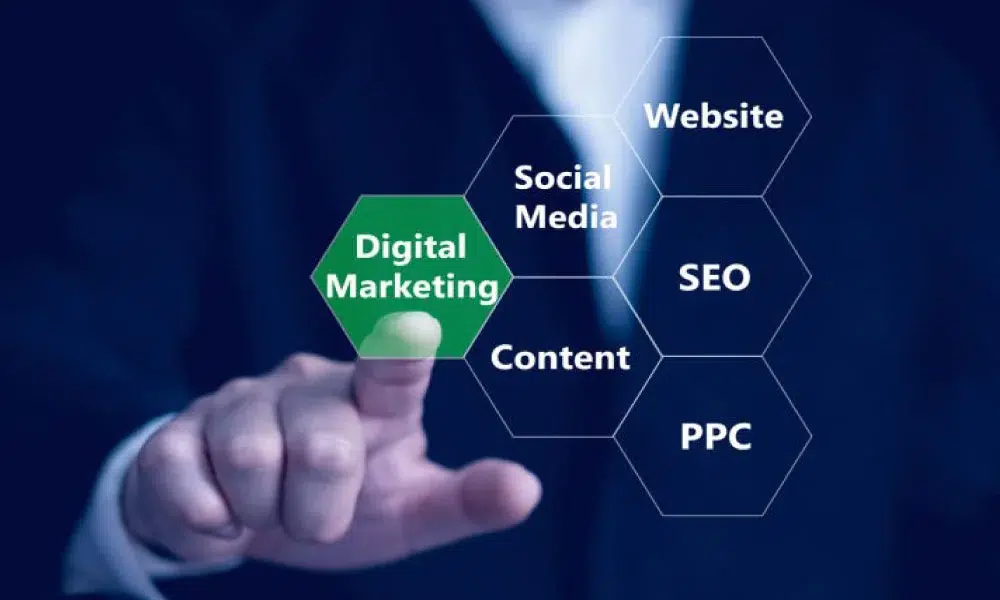Types of digital marketing have completely transformed how companies interact with customers. Digital marketing has become an essential strategy for every business, whether small startups or multinational corporations. Instead of relying only on traditional methods like TV, radio, or print, brands are now turning to online marketing channels that offer better targeting, measurable results, and global reach.
In this detailed guide, we will cover all the major types of digital marketing, explain how they work, and show you why businesses must adopt a combination of these methods to succeed in today’s competitive marketplace.
What is Digital Marketing?
Digital marketing is the practice of promoting products or services using online platforms, digital tools, and internet-based technologies. Unlike traditional marketing, it provides real-time analytics, cost-effective campaigns, and highly targeted communication.
Some of the most effective digital marketing strategies include:
- Search Engine Optimization (SEO)
- Content Marketing
- Social Media Marketing (SMM)
- Pay-Per-Click Advertising (PPC)
- Email Marketing
- Affiliate Marketing
- Influencer Marketing
- Mobile Marketing
- Video Marketing
Each of these online marketing methods has unique benefits, and when used together, they can significantly increase brand visibility and revenue.
Why Businesses Need Different Types of Digital Marketing
Before diving into each strategy, it’s important to understand why businesses shouldn’t depend on only one type of digital promotion.
- Broader audience reach – Different platforms attract different user groups.
- Increased website traffic – Multiple sources generate consistent visitors.
- Improved conversions – Each stage of the customer journey can be optimized.
- Higher brand credibility – Being visible across multiple digital channels builds trust.
- Better ROI – Diversified marketing efforts reduce dependency on a single channel.
Major Types of Digital Marketing
Now, let’s break down the most impactful types of digital marketing every brands should know.
1. Search Engine Optimization (SEO)
Search Engine Optimization (SEO) is one of the most powerful and cost-effective digital strategies. It focuses on optimizing websites to rank higher in search engine results pages (SERPs) like Google and Bing.
Benefits of SEO:
- Generates consistent organic traffic.
- Builds authority and trust for your brand.
- Enhances user experience with better navigation and speed.
- Provides long-term results compared to paid ads.
Types of SEO:
- On-page SEO – Optimizing web pages with keywords, titles, meta descriptions, and internal links.
- Off-page SEO – Building high-quality backlinks and improving domain authority.
- Technical SEO – Enhancing site speed, mobile responsiveness, and crawlability.
- Local SEO – Targeting location-based searches with tools like Google Business Profile.
Businesses that invest in SEO strategy not only improve rankings but also increase lead generation and brand visibility.
2. Content Marketing
Content marketing is about creating valuable and relevant content to attract and engage a defined audience. Instead of directly selling, the goal is to build trust and provide solutions.
Popular Types of Content Marketing:
- Blog posts and long-form articles
- E-books and whitepapers
- Infographics and visual guides
- Podcasts and webinars
- Case studies and customer success stories
Why Content Marketing Works:
- Improves SEO rankings by targeting long-tail keywords.
- Builds authority in your industry.
- Engages users across different content distribution platforms.
- Drives traffic and nurtures leads for conversion.
Brands that develop a strong content strategy position themselves as leaders and attract organic engagement from their target audience.
3. Social Media Marketing (SMM)
Social media marketing involves promoting products and services through platforms like Facebook, Instagram, LinkedIn, Twitter (X), Pinterest, and TikTok.
Advantages of Social Media Marketing:
- Boosts brand awareness and recognition.
- Helps connect directly with customers.
- Supports both organic posts and paid campaigns.
- Provides data insights with social media analytics.
Key SMM Strategies:
- Running targeted Facebook ads and Instagram ads.
- Posting engaging video content like reels and stories.
- Building communities on LinkedIn for B2B networking.
- Leveraging hashtags for increased visibility.
Social platforms are especially useful for reaching younger demographics and building strong brand loyalty.
4. Pay-Per-Click (PPC) Advertising
Pay-per-click advertising (PPC) is a paid marketing model where businesses pay every time a user clicks on their ad. Platforms like Google Ads, Bing Ads, and social networks make it possible to reach a highly targeted audience instantly.
Benefits of PPC:
- Provides immediate website traffic.
- Allows precise targeting by demographics, interests, and location.
- Highly measurable with conversion tracking.
- Ideal for new businesses looking for quick results.
Common PPC Ad Formats:
- Search ads on Google.
- Display ads on partner websites.
- Shopping ads for e-commerce.
- Remarketing ads targeting past visitors.
When combined with SEO, PPC becomes a powerful way to dominate both organic and paid search results.
5. Email Marketing
Email marketing is one of the most effective channels for nurturing long-term customer relationships. By sending personalized email campaigns, brands can deliver value directly to users’ inboxes.
Benefits of Email Marketing:
- Builds trust and loyalty with subscribers.
- Increases email open rates and engagement.
- Helps promote new products, offers, and events.
- Drives traffic to websites and landing pages.
Best Practices:
- Segment audiences for targeted campaigns.
- Craft compelling subject lines.
- Automate campaigns with email marketing tools.
- Use personalization to improve conversions.
A strong email marketing strategy ensures consistent communication and higher customer retention.
6. Affiliate Marketing
Affiliate marketing is a performance-based strategy where businesses partner with affiliates who promote their products in exchange for commission on each sale.
Benefits of Affiliate Marketing:
- Expands reach without heavy ad costs.
- Leverages influencers, bloggers, and publishers.
- Generates passive revenue for both parties.
- Provides measurable performance tracking.
Popular platforms like Amazon Associates and ShareASale have made affiliate programs accessible for businesses of all sizes.
7. Influencer Marketing
Influencer marketing leverages the credibility and reach of influencers on platforms like Instagram, YouTube, and TikTok. These individuals already have established trust with their audience, making promotions more effective.
Why Influencer Marketing Works:
- Builds instant credibility.
- Increases brand visibility among niche audiences.
- Drives conversions through authentic recommendations.
- Works well for both B2C and B2B campaigns.
Collaborating with micro-influencers is often more cost-effective and brings highly engaged followers compared to celebrity endorsements.
8. Mobile Marketing
With most people accessing the internet through smartphones, mobile marketing has become a must for brands.
Types of Mobile Marketing:
- SMS marketing campaigns
- Mobile app marketing
- In-app ads
- Push notifications
Optimizing websites for mobile-friendly experiences and investing in mobile-first strategies ensures businesses reach audiences wherever they are.
9. Video Marketing
Video marketing has emerged as one of the fastest-growing forms of digital promotion. Platforms like YouTube, Instagram Reels, and TikTok videos make it easy to reach millions.
Benefits of Video Marketing:
- Increases engagement and retention.
- Improves search engine rankings with video content.
- Explains complex topics more effectively.
- Boosts conversions through product demos and testimonials.
Brands that combine video marketing strategy with SEO, social media promotion, and the power of AI-driven analytics see massive results in both awareness and sales
Final Thoughts
The different types of digital marketing give businesses endless opportunities to connect with their audience. From SEO and content marketing to email campaigns, affiliate programs, and video ads, each strategy contributes to long-term growth.
The key is to develop an integrated digital marketing strategy that combines multiple channels instead of relying on just one. By doing so, businesses can maximize visibility, strengthen brand authority, and achieve sustainable success in the competitive online world.




